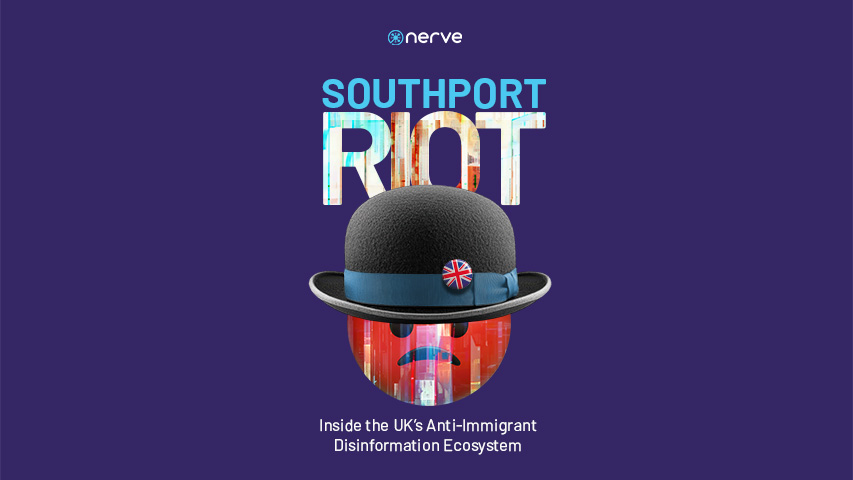Southport Riot: Inside the UK’s Anti-Immigrant Disinformation Ecosystem
Read more
The Nerve's report uncovers a structured lifecycle of disinformation: narratives are seeded in niche echo chambers, reinforced through repetition and community validation, and opportunistically amplified during crises
On July 29, 2024, a stabbing at a dance studio in Southport, Merseyside, left three people seriously injured. Within hours, disinformation began circulating online, falsely identifying the suspect as “Ali Al-Shakati,” an asylum seeker who had arrived by boat. In reality, the suspect was a 17-year-old British-born citizen from Cardiff. Yet the narrative stuck. Over the next week, violent protests erupted in 23 towns across the UK, driven by digital outrage and a wave of anti-immigrant disinformation.
This report presents findings from The Nerve’s investigation into the online information ecosystem surrounding the Southport Riot and the broader rise of anti-immigrant disinformation in the United Kingdom. Drawing from over 27 million social media posts across X (formerly Twitter), Facebook, YouTube, and TikTok between October 2022 and November 2024, and complemented by a nationally representative YouGov survey (n=2,000; conducted December 6–11, 2024), the study reveals how long-running disinformation campaigns, powered by far-right networks and global influencers, primed online communities for unrest — and how a single crisis event ignited a nationwide wave of protest and hate.
At the center of this unrest was the tragic stabbing in Southport on July 29, 2024. False claims about the suspect’s immigration status emerged almost immediately, sparking a digital backlash that quickly escalated into real-world violence. This disinformation — crafted to exploit existing fears and frustrations — was picked up and amplified by nationalist groups, right-wing media outlets, and anonymous accounts. From July 30 to August 5, violent protests erupted in 23 towns and cities across the UK, fueled by anti-immigrant sentiment.
The report uncovers a structured lifecycle of disinformation: narratives are seeded in niche echo chambers, reinforced through repetition and community validation, and opportunistically amplified during crises. This cycle is accelerated by platform-specific features, such as algorithmic boosts and insular group dynamics, that reward engagement over information.
Key to this amplification is a range of malign actors: Communities aligned with Reform UK, conspiracy groups, hyper-partisan influencers, and verified X Premium users with high visibility. These actors leveraged emotionally charged content to frame immigrants as threats to public safety, economic stability, and British identity. Global figures like Elon Musk and Andrew Tate fanned out these narratives, bridging UK discourse with broader transnational conspiracies.
The consequences are tangible. Disinformation around the Southport Riot directly influenced public opinion, shifted political alignments, and exacerbated hostility toward immigrants. Support for Reform UK surged, distrust in mainstream media deepened, and a significant number of UK immigrants reported increased feelings of fear, exclusion, and discrimination.
The study finds that the UK’s regulatory framework, including the Online Safety Act, fails to adequately address the mechanisms by which disinformation spreads. While current policies focus on illegal or harmful content, they overlook the strategic, patterned manipulation of online discourse that enables narratives to gain power over time.
Key Findings
- Trigger Event: The tragic stabbing in Southport was strategically exploited by right-wing actors to escalate pre-existing anti-immigrant narratives into widespread unrest.
- Pre-seeded Narratives: Disinformation was systematically planted and nurtured long before the Southport incident, creating a receptive environment for rapid amplification during crises.
- Central Role of Malign Actors: Far-right groups, hyper-partisan media such as GB News, and anonymous online accounts played critical roles in spreading and legitimizing false claims.
- Platform Dynamics: Algorithmic incentives on platforms like X, Facebook, TikTok, and YouTube accelerated the dissemination of emotionally charged and divisive content, rewarding outrage and engagement over accuracy.
- Global Amplification: International right-wing influencers, notably Elon Musk and Andrew Tate, significantly boosted these harmful narratives, connecting domestic unrest to broader global conspiracy networks.
This report underscores the urgent need for regulatory reform and platform accountability. Addressing the spread of harmful narratives requires moving beyond content moderation and toward a deeper understanding of the networks, incentives, and crisis triggers that sustain digital disinformati
Complete the form below to download the full report.

This report uncovers a structured lifecycle of disinformation: narratives seeded in niche echo chambers, reinforced through repetition & community validation, and amplified during crises




